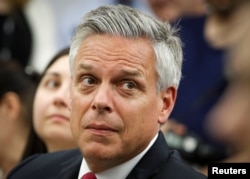When Donald Trump first spoke to Russian President Vladimir Putin after becoming U.S. president, he reviled the "New Start" treaty — a pillar of arms control — as a bad deal for America.
When the two meet in Helsinki on Monday they are likely to touch on whether to extend that agreement to 2026 and what to do about another pact, the Intermediate-Range Nuclear Forces Treaty (INF) to try to dampen a high-risk nuclear rivalry between the two former Cold War foes.
Former U.S. officials, arms control experts and diplomats do not expect a decision on New Start renewal or the INF Treaty at Helsinki but rather, at best, a deal for experts to take up the issues.
“The most likely outcome is the restarting of the strategic stability talks between the U.S. and Russia,” said Frank Rose, a former U.S. assistant secretary of state for arms control now at the Brookings Institution think tank.
The last U.S.-Russian talks on “strategic stability” — a catch-all term for issues related to nuclear arms control — occurred in September and a subsequent round slated for March was canceled, reflecting strains in the relationship.
An agreement to reopen talks would allow both sides to argue that they are tackling a major issue, a result analysts said might appeal to both leaders’ egos, while leaving it to lower-level officials to grapple with the nitty gritty.
It might also be a rare accomplishment for two nations at odds over charges Moscow interfered in the 2016 U.S. election, Russia's 2014 annexation of Crimea and support for separatists in eastern Ukraine, which have triggered U.S. sanctions, and their involvement on opposite sides of the Syrian civil war.
Ahead of the summit, Russian diplomats have stressed the need for strategic stability talks, saying existing arms control treaties are fraying at the edges and they fear Washington will withdraw from the INF treaty. Both sides accuse one another of violating the treaty.
‘Long pants’
“The idea of dealing with the U.S. as equals in this one area of nuclear arms, where Russia is the only other party in the world that is comparable to the United States, has some appeal (to Moscow),” said a former senior U.S. official.
“(It) appeals to their sense of dealing with us as equals, as the other party that wears long pants on these issues,” the former official, who spoke on condition of anonymity, added.
Historically, arms control has been an area where Washington and Moscow have been able to talk to one another even when their broader relationship has been in tatters.
U.S. Ambassador to Russia Jon Huntsman told reporters Trump and Putin will likely discuss INF and New Start but would not be drawn on whether they might strike any deals.
Russian diplomats have repeatedly spoken of the need to launch talks on strategic nuclear stability.
Kremlin aide Yuri Ushakov said the summit might produce a joint statement that would set out actions the two countries would take to maintain international stability and security.
New Start, signed in 2010, requires both nations to cut their deployed strategic nuclear warheads to no more than 1,550, the lowest level in decades.
The treaty, which also limits deployed land- and submarine-based missiles and nuclear-capable bombers, expires in February 2021, can be extended by five years if both sides agree.
A U.S. official said Trump would be ready to talk about New Start if Putin raised it, but it was not a big U.S. priority.
The INF Treaty, signed in 1987, required both sides to eliminate their ground-launched ballistic and cruise missiles with ranges between 500 and 5,500 km (310 and 3,420 miles).
Arms control experts say there is a delicate interplay between how the United States may handle the two treaties.
A second former senior U.S. official argued Russia needs New Start extended more than the United States does, in part because of its budgetary constraints, and worried Trump could agree to this without pressing for Russian compliance on the INF pact.
“The worst outcome is ... that Trump thinks he is a big deal maker and a big arms controller ... (and gives) Putin something that Putin needs far more than we do,” said the former official on condition of anonymity.
The United States has asserted since 2014 that Russia has violated the INF Treaty by developing the SSC-8 ground-launched cruise missile system. In 2017, Washington said it believed Moscow had not merely developed but deployed the missile, threatening U.S. allies in NATO and U.S. forces in Europe.
While there are published reports Trump aspired to be an arms control negotiator during the heyday of his real estate career, there is deep skepticism among former U.S. officials he has mastered the subject’s intricacies.
Further, Trump has operated under the shadow of suspicions about his campaign’s connections to Moscow, which are being investigated by Special Counsel Robert Mueller.
“The problem is there is so little confidence in what the president is going to do that any suggestion of a deal by him is automatically suspect,” said Eugene Rumer, a former U.S. national intelligence officer for Russia now at Washington’s Carnegie Endowment for International Peace think tank.
Rumer suggested Helsinki could yield something like Trump’s June meeting with North Korean leader Kim Jong Un, where they issued a general statement on denuclearization and left the details to others.
“They can agree to engage in a robust conversation,” he added. “Similar to what transpired apparently, in Singapore ... the heavy lift is going to be on the part of the negotiators.”







